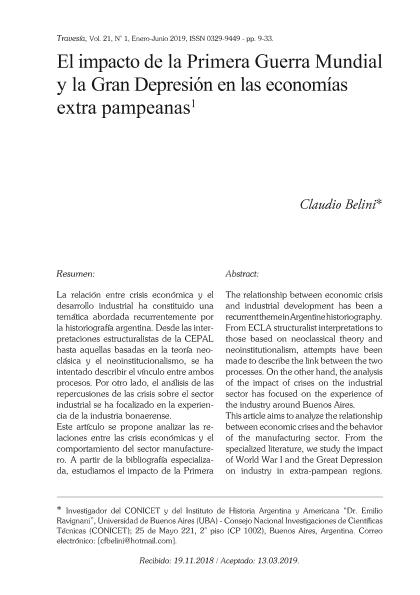Artículo
La relación entre crisis económica y el desarrollo industrial ha constituido una temática abordada recurrentemente por la historiografía argentina. Desde las interpretaciones estructuralistas de la CEPAL hasta aquellas basadas en la teoría neoclásica y el neoinstitucionalismo, se ha intentado describir el vínculo entre ambos procesos. Por otro lado, el análisis de las repercusiones de las crisis sobre el sector industrial se ha focalizado en la experiencia de la industria bonaerense. Este artículo se propone analizar las relaciones entre las crisis económicas y el comportamiento del sector manufacturero. A partir de la bibliografía especializada, estudiamos el impacto de la Primera Guerra Mundial y la Gran Depresión sobre la industria en las regiones extrapampeanas. Sostenemos que el vínculo entre crisis económica y desempeño industrial ha sido muy diverso a lo largo de la historia económica argentina y que, por lo tanto, no existió una relación unívoca. En los casos de la crisis de 1913-1917 y de la Gran Depresión, su impacto sobre la industria extra pampeana se vio muy condicionada por la trayectoria previa. Las regiones vitivinícola y azucarera padecían desde finales del siglo XIX o principios del siglo XX, desequilibrios productivos y problemas de competitividad que las hacían muy dependientes de la demanda del mercado interno. Por tanto, el entorno macroeconómico nacional condicionó la trayectoria de esas regiones. Además, el desempeño regional dependió también de la dotación de factores, el desarrollo industrial previo y la presencia de actores económicos capaces de percibir las oportunidades. Si bien estudios recientes han mostrado que esas economías regionales lograron desarrollar previamente un incipiente tejido industrial, parece claro que esas crisis no ofrecieron los estímulos suficientes para promover cambios estructurales. The relationship between economic crisis and industrial development has been a recurrent theme in Argentine historiography. From ECLA structuralist interpretations to those based on neoclassical theory and neoinstitutionalism, attempts have been made to describe the link between the two processes. On the other hand, the analysis of the impact of crises on the industrial sector has focused on the experience of the industry around Buenos Aires. This article aims to analyze the relationship between economic crises and the behavior of the manufacturing sector. From the specialized literature, we study the impact of World War I and the Great Depression on industry in extra-pampean regions We argue that the link between economic crisis and industrial performance has varied over Argentina’s economic history and, therefore, there was no unique relationship. In the cases of the crisis of 1913-1917 and the Great Depression, its impact on the extra-pampean industry was very conditioned by the previous trajectory. Since the late 19th or early 20th Century, the wine and sugar regions suffered productive imbalances and competitiveness problems that made them very dependent on the demand of the domestic market. Therefore, the national macroeconomic environment conditioned the trajectory of these regions. In addition, regional performance also depended on the factor endowment, the previous industrial development and the presence of economic actors capable of perceiving the opportunities. While recent studies have shown that these regional economies achieved previously developed an incipient industrial fabric, it seems clear that these crises did not offer enough incentives to promote structural change.
El impacto de la Primera Guerra Mundial y la Gran Depresión en las economías extrapampeanas
Fecha de publicación:
07/2019
Editorial:
Universidad Nacional de Tucumán. Facultad de Ciencias Económicas
Revista:
Travesia
ISSN:
0329-9449
Idioma:
Español
Tipo de recurso:
Artículo publicado
Clasificación temática:
Resumen
Palabras clave:
CRISIS ECONOMICA
,
INDUSTRIA
,
REGION AZUCARERA
,
REGION VITIVINICOLA
Archivos asociados
Licencia
Identificadores
Colecciones
Articulos(INSTITUTO "DR. E.RAVIGNANI")
Articulos de INST. DE HISTORIA ARGENTINA Y AMERICANA "DR. EMILIO RAVIGNANI"
Articulos de INST. DE HISTORIA ARGENTINA Y AMERICANA "DR. EMILIO RAVIGNANI"
Citación
Belini, Claudio Fabian; El impacto de la Primera Guerra Mundial y la Gran Depresión en las economías extrapampeanas; Universidad Nacional de Tucumán. Facultad de Ciencias Económicas; Travesia; 21; 1; 7-2019; 9-33
Compartir




